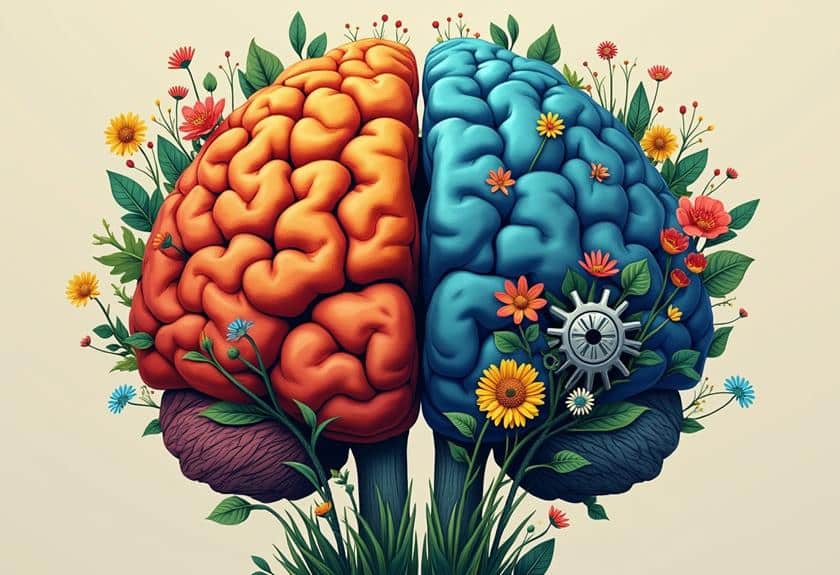
A growth mindset shapes how you respond to challenges and setbacks, directly impacting your personal and professional growth. With a growth mindset, you see abilities as malleable, welcoming challenges as opportunities to learn. This fosters resilience and adaptability, enabling you to turn setbacks into gains. Professionally, it supports skill development and creativity, boosting collaboration and problem-solving in changing environments. Conversely, a fixed mindset hinders potential by viewing abilities as static. Cultivating a growth mindset involves embracing challenges, valuing effort, and viewing failures as learning opportunities.

As you explore different mindset strategies, you will quickly realize how essential a good one is in shaping your approach to challenges and growth. At its core, mindset refers to the beliefs you hold about your abilities and potential.
There are primarily two types of mindset: fixed and growth mindsets. If you have a fixed mindset, you might believe your skills and intelligence are static, often avoiding challenges to prevent failure. On the other hand, with a growth mindset, you see abilities as malleable, welcoming challenges as opportunities to learn and grow.
Recognizing these mindsets is vital because they influence your reactions to setbacks. By understanding which mindset you lean towards, you can begin to foster a more adaptive and resilient outlook.
For Sheepdogs, a fixed mindset is tantamount to failure. We must learn to adapt and foster a dynamic strategy to how we approach life.

Recognizing your mindset type isn't just about awareness; it plays a significant role in personal development. By understanding whether you have a fixed or growth mindset, you can better navigate challenges and setbacks. A growth mindset encourages you to embrace learning, view failures as opportunities, and persist through difficulties.
This mindset empowers you to cultivate resilience and adaptability, essential traits for personal growth. On the other hand, a fixed mindset might limit your potential, making it difficult to evolve and improve. When you actively work on shifting your mindset, you open doors to new experiences and growth opportunities.
This shift enables you to develop self-awareness, emotional intelligence, and a lifelong love for learning, positively impacting your personal development journey.

In the domain of professional success, mindset acts as a catalyst for achievement and advancement. When you embrace a growth mindset, you believe that your skills and intelligence can be developed with effort, learning, and persistence.
This belief encourages you to take on challenges, seek feedback, and continuously improve. You become more adaptable to change, which is essential in today's fast-paced work environments. Additionally, a positive mindset enhances your problem-solving abilities and fosters creativity, enabling you to find innovative solutions.
It also impacts your relationships with colleagues, promoting collaboration and effective communication. By maintaining a forward thinking mindset, you're more likely to set ambitious goals and remain motivated to achieve them, ultimately leading to greater professional success and personal fulfillment.

Facing challenges head-on, a growth mindset empowers you to view obstacles as opportunities for learning and development. By embracing this perspective, you transform setbacks into stepping stones. Instead of seeing failure as a dead end, you perceive it as a chance to improve and gain valuable insights.
This mindset, much like the Sheepdog ideology of guardianship and resilience, encourages resilience, allowing you to persist even when things get tough. You learn to adapt, finding new solutions to problems rather than giving up. As you confront difficulties, you develop a deeper understanding of your abilities and limitations.
This self-awareness helps you grow personally and professionally. With a growth mindset, you're equipped to tackle challenges with optimism and determination, turning potential roadblocks into pathways for success and personal fulfillment.

To cultivate a growth mindset, start by embracing challenges as opportunities rather than obstacles. Recognize that effort is an essential part of the learning process, and don't shy away from hard work.
When you face setbacks, view them as lessons and seek feedback to make improvements. Surround yourself with people who encourage growth and learning, fostering a supportive environment. Set realistic goals and celebrate small victories to build confidence. Engage in positive self-talk to reinforce your ability to grow and improve.
Practice gratitude by acknowledging your progress and strengths. Finally, remain curious and open to new experiences, as they can expand your understanding and skills. By consistently applying these strategies, you'll nurture a mindset focused on growth and development.
Your mindset greatly influences relationships and social interactions. If you adopt a positive, open, and flexible mindset, you're more likely to communicate effectively, empathize with others, and build meaningful connections. This mindset encourages active listening and adaptability, which fosters trust and mutual understanding. Conversely, a closed or negative mindset can create barriers, leading to misunderstandings and conflict. Your approach shapes how you perceive others, impacting the quality and depth of your interactions.
Your mindset plays an essential role in shaping your emotional resilience and coping mechanisms. When you adopt a growth mindset, you view challenges as opportunities to learn, making you more adaptable in tough situations. This perspective encourages you to bounce back from setbacks and handle stress more effectively. A fixed mindset, on the other hand, might hinder your resilience, as it leads you to perceive difficulties as insurmountable, affecting your emotional well-being.
Your mindset greatly impacts your physical health and wellness. When you maintain a positive attitude towards exercise and healthy eating, you're more likely to adopt and sustain beneficial habits. A growth mindset encourages you to view challenges as opportunities, helping you overcome obstacles in your fitness journey. Conversely, a fixed mindset may hinder progress by fostering negative beliefs about your abilities, affecting both motivation and physical well-being.
Your mindset directly influences your creativity and innovation. When you adopt a growth mindset, you believe your skills and intelligence can improve with effort. This belief encourages you to take risks, embrace challenges, and learn from failures, fostering an environment where innovative ideas can thrive. By staying open to new experiences and perspectives, you enhance your creative thinking. Ultimately, your mindset shapes how you approach problems, leading to more inventive solutions.
Your mindset can greatly impact your decision-making and problem-solving abilities. When you approach situations with an open and positive mindset, you're more likely to weigh multiple perspectives and generate creative solutions. This flexibility helps you adapt to challenges and make informed decisions. Conversely, a fixed mindset may limit your options, as it might prevent you from seeing beyond established norms. Cultivating a growth-oriented mindset enhances your ability to navigate complex situations effectively.
Your mindset plays a vital role in shaping your growth, both personally and professionally. By understanding different mindset types, you can identify how they affect your development and success. Embracing a growth mindset helps you overcome challenges, turning obstacles into opportunities for learning. To cultivate this mindset, focus on strategies like embracing feedback, setting achievable goals, and maintaining perseverance. With deliberate effort, you can foster an outlook that supports continuous improvement and maximizes your potential.
Liana says:
Your expertise on this subject is impressive and invaluable.